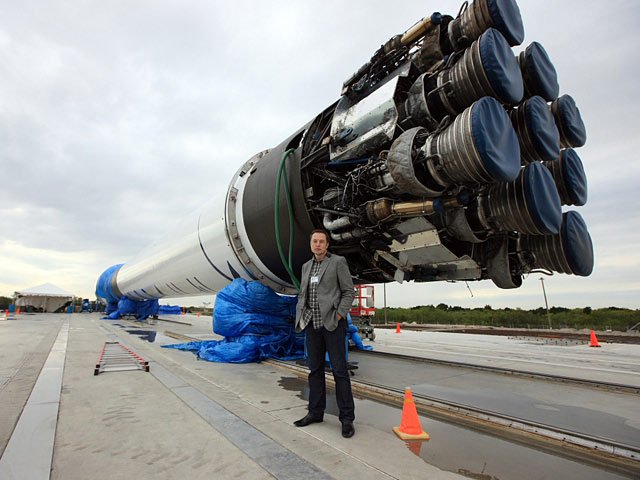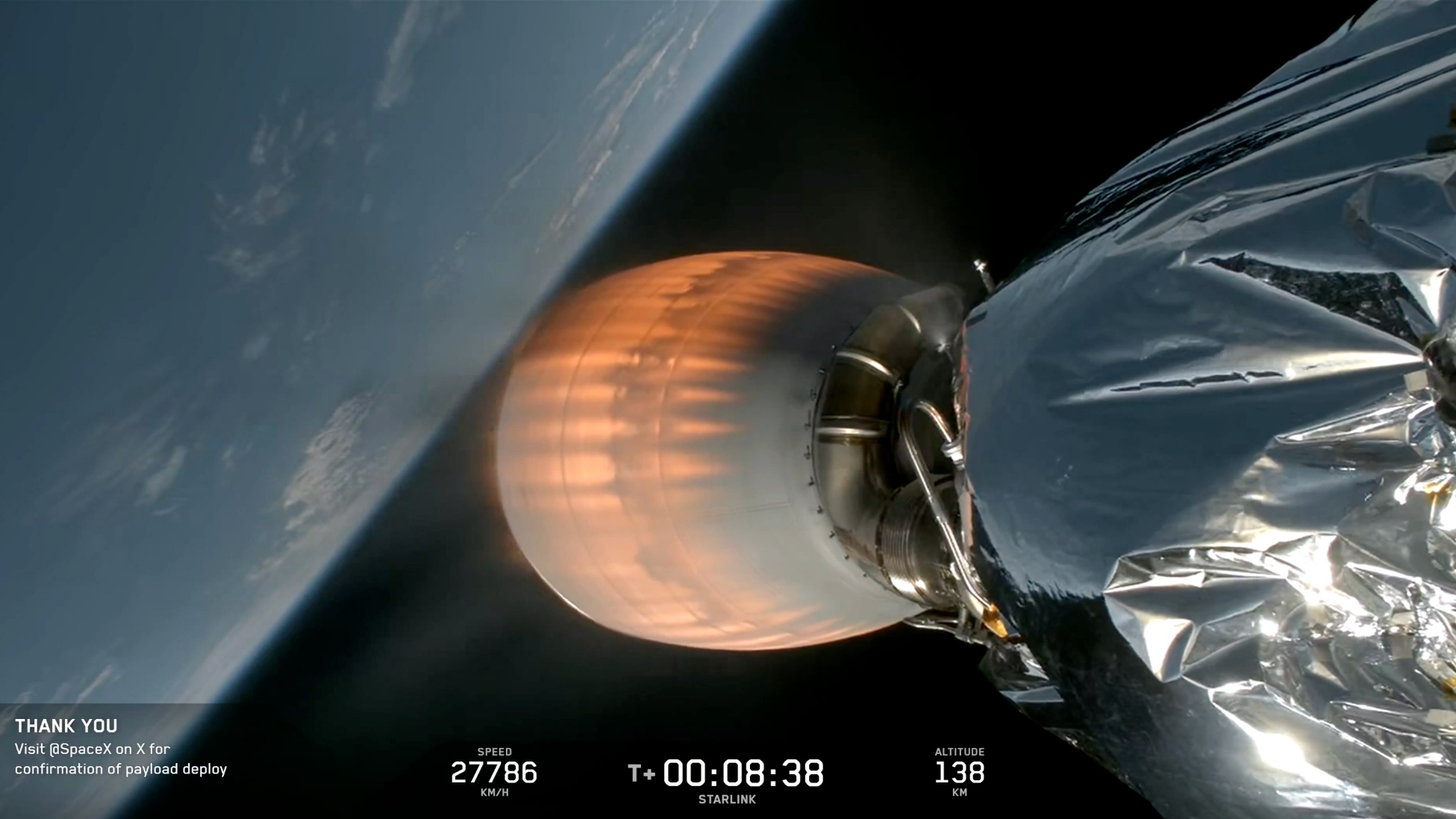Entrepreneur Elon Musk On Weathering the CEO Storm

Breaking space news, the latest updates on rocket launches, skywatching events and more!
You are now subscribed
Your newsletter sign-up was successful
Want to add more newsletters?

Delivered daily
Daily Newsletter
Breaking space news, the latest updates on rocket launches, skywatching events and more!

Once a month
Watch This Space
Sign up to our monthly entertainment newsletter to keep up with all our coverage of the latest sci-fi and space movies, tv shows, games and books.

Once a week
Night Sky This Week
Discover this week's must-see night sky events, moon phases, and stunning astrophotos. Sign up for our skywatching newsletter and explore the universe with us!

Twice a month
Strange New Words
Space.com's Sci-Fi Reader's Club. Read a sci-fi short story every month and join a virtual community of fellow science fiction fans!
Entrepreneur Elon Musk is no stranger to corporate success. At39, he's parlayed his success from co-founding PayPal, the onlinepayment system, into the bustling privaterocket company SpaceX and the electric car manufacturer TeslaMotors, both of which have made great leaps in recent months.
But sometimes leading a company — especially onethat blastsrockets into the final frontier — can be a rocky road andMusk has hadhis share of those experiences, too.
As CEO of SpaceX (SpaceExploration Technologies) and Tesla Motors, Musk has overseenboth companies through two major hurdles over the last two months. Itcaps years of work through what, at times, has been a dismal economy. [Related:4 Tips for Business Success From Entrepreneur Elon Musk]
"If you're the CEO of a company, you have to workyour bloody ass off. And if you're the CEO of two companies you have towork two bloody asses off and you don’t have two asses," Musk toldBusinessNewsDaily. "And then if you combine that with a terribleeconomy, that just makes the job even harder. It's been areallygrueling several years."
But in June, his work with SpaceX and Tesla came to a head.Early that month, Musk watched as SpaceX's first Falcon 9 rocket (uponwhich rests $1.6 billion in NASA contracts) successfully soared intospace on the first try. That was followed June 29 by the Tesla MotorsIPO, which raised a reported $226.1 million for the electric carcompany after selling 13.3 million shares, more than expected.
"It's been a long and difficult road," Musk said.
At the same time, Musk is also weathering a very differentstorm in the form of a very public divorce that has put his family lifeand personal finances (and the fact that much of his wealth isnon-liquid) in the limelight. He recently spoke out on the matter inthe Huffington Post to counter inaccuracies he found in several mediareports.
Breaking space news, the latest updates on rocket launches, skywatching events and more!
"Hopefully it goes a long way to correcting it," Musk said ofhis Huffington Post statement. "It was just very difficult on apersonal level."
Launching into new frontiers
Musk's success with the recent ventures builds largely onearlier successes on the Internet. He sold his first company Zip2, anInternet software firm he founded with his brother Kimbal, to Compaq in1999 for $307 million in an all-cash transaction.
Musk then co-founded what became PayPal, which was later soldto eBay for $1.5 billion in October 2002, providing the seed money forthe launch of SpaceX that same year. He co-founded Tesla Motors in 2003and also helped create Solar City, a leader in the solar power industry.
"Fortunately, I didn't need to raise money because I justrepurposed money that I had from the sale of PayPal to eBay," Musk saidof his Hawthorne, Calif.-based SpaceX. "I think it would have been verydifficult to raise money. It's not like one can point to a lot ofexamples of private rocket companies that succeeded. It's super far outof the comfort zone of almost any venturecapitalist."
Investors did eventually come, but only after SpaceX had madesome substantial progress, said Musk, who ended up having to design thecompany's rockets because of difficulties finding willing and capableengineers to sign on.
"Initially, I didn't intend to be the chief designer of therocket; I kept trying to hire someone to be chief designer of therockets. But the people who were willing to join early on weren't up tothe task and the people that were weren't willing to join," said Musk,who has a physics degree from University of Pennsylvania and a businessdegree from Wharton. "It was a huge learning curve. I read like crazyand I did a lot of experimentation and we had a great team in theirspecific disciplines in terms of propulsion, navigation and others."
Right people for the right job
That team proved indispensable in getting SpaceX'srockets into orbit after several attempts, though Musk admitsthat the company would likely have reached orbit sooner had he moreexperience on the intricacies of rocket launches and launch sites.
In 2005, SpaceX's first rocket — the Falcon 1 — failed shortlyafter launching from Kwajalein Atoll in the Marshall Islands of thePacific Ocean. Corrosion from the harsh sea water was to blame, andit took three more attempts before the first Falcon 1 successfullyreached orbit in 2008.
In those early days, SpaceX's ranks numbered around 120 employees.The company now has around 1,100 workers spread across its launchsites, rocket factory and engine proving ground in Texas.
When the first Falcon 9 launched with a test version ofSpaceX's Dragon spacecraft — a cargo ship for the InternationalSpace Station — it reached orbit from CapeCanaveral, Fla.,on the first launch try.
"I think it's incredibly important to pick the right people.The right team can accomplish miracles," Musk said. "The wrong team, orif a team isn't working together, well, that can be a huge problem, aswell."
Musk said he looks for signs of exceptional achievement among prospectivehires,and leans more towards engineering or science skills rather thanbusiness acumen. Teamwork among those hires is imperative for anybusiness, be they a small start-up or a big corporation.
"Running a company, it's like if you're running a major leaguebaseball or football team," Musk said. "It's just, 'How good are yourplayers? How good are they working together?' And that will definesuccess."
The growth factor
Knowing the right time to grow and keep your focus are alsokey skills Musk has drawn on, particularly lately with SpaceX and TeslaMotors.
In 2007, SpaceX, which needed more space to build its Falconrockets(the two-stage Falcon 9 is 178 feet long), moved its Californiaheadquarters from El Segundo to nearby Hawthorne to set up its Falconrocket shop inside an old Boeing 747 jet fuselage factory.
The building's roof alone is as large as a football stadiumand the factory's interior is almost "big enough to have its ownweather system," Musk said in 2007 after SpaceX made the move. Butdeciding when to make such a move — as well as hire moreemployees —takes preparation and funding, so timing a company's growth is key, hesaid.
"It's difficult to prepare too far in advance because we justdon't have the capital to go ahead and spend a ton of money on justsort of hoping that something will happen," Musk added. "So we kind ofjust have to grow really fast when it happens."
Staying focused is also vital, especially when a CEO'spersonal matters encroach into the business area. Musk said thatdespite the wide media coverage of his divorce this summer, that didn'tmean he could take his attention away from SpaceX's vital Falcon 9launch debut or the TeslaMotors IPO.
"Particularly for the last several months, I had to make surethat I got two things right. That the Falcon 9 that I designed with myteam that that would get to orbit, and then the other thing was thatthe Tesla IPO would be successful," he said.
“So I had to just give everything towards those two items. Andeven though people were saying things that were just untrue andincredibly hurtful, I just couldn't allocate any time to dealing withthat,” Musk said.
It was only later, after both hurdles had been successfullynavigated, that Musk spoke out publicly on his divorce and subsequentengagement, in the “Huffington Post.”
"It's sort of like if somebody's punching you but you'reengaged in some critical task and you have to just let them punch you.I was finally able to correct the record in a large part," he said.
More critics
Musk's personal life is not the only thing that has drawncritics.
With successful launches of its Falcon 1 and larger Falcon 9rockets under its belt, SpaceX is one of the leading contenders to meetNASA's needs of commercial spacecraft to ferry supplies to theInternational Space Station. The company already has a $1.6 billioncontract in hand to provide 12 cargo flights using its Falcon 9 rocketsand its Dragonspacecraft (the Falcon 1 rocket is used to launch smallersatellites — both rockets are reportedly named after theMillenniumFalcon from 'Star Wars').
Musk has said in the past that the gumdrop-shaped Dragon —reportedly named after Puff the Magic Dragon to spite critics— couldbe ready to launch humans into space within three years after gettingthe call from NASA to do so.
But despite recent successes, critics have downplayed thecompany’ssuccesses as part of the debate swirling around NASA's shift to commercialspacecraft like Dragon and the Falcon 9 rocket for its humanspaceflight needs.
"Even this modest success is more than a year behind schedule,and the project deadlines of other private space companies continue toslip as well," Sen. Kay Bailey Hutchison (R-Texas) said in a June 4statement after Falcon 9's first flight. "This test does not change thefact that commercial space programs are not ready to close the gap inhuman spaceflight if the space shuttle is retired this year with noproven replacement capability and the Constellationprogram is simultaneously cancelled as the Presidentproposes."
Musk said that's par for the course.
"Some people will just be die-hard critics. The reality is,we've got the biggest launch contract ever and we're going to beresponsible for 12 out of 20 commercial cargo flights to the spacestation," he added.
The other eight commercial cargo flights to the space stationwill be provided by OrbitalSciences, a veteran rocket launch provider based in Virginia,under a $1.9 billion contract with NASA.
And Musk hasn't slowed down. In mid-June, before the TeslaMotors IPO, SpaceX announced an unprecedented launch contract withsatellite company Iridium Communications, Inc. The deal is worth $492million and calls on SpaceX to launch Iridium's new communicationsatellite constellation, called Iridium NEXT, over a series of liftoffsfrom California's Vandenberg Air Force Base between 2015 and 2017.
"It's the biggest commercial launch services deal in history,"Musk said. "How about that?"
This story wasprovided by BusinessNewsDaily, a SPACE.comsister site. Tariq Malik isManaging Editor of SPACE.com.

Tariq is the award-winning Editor-in-Chief of Space.com and joined the team in 2001. He covers human spaceflight, as well as skywatching and entertainment. He became Space.com's Editor-in-Chief in 2019. Before joining Space.com, Tariq was a staff reporter for The Los Angeles Times covering education and city beats in La Habra, Fullerton and Huntington Beach. He's a recipient of the 2022 Harry Kolcum Award for excellence in space reporting and the 2025 Space Pioneer Award from the National Space Society. He is an Eagle Scout and Space Camp alum with journalism degrees from the USC and NYU. You can find Tariq at Space.com and as the co-host to the This Week In Space podcast on the TWiT network. To see his latest project, you can follow Tariq on Twitter @tariqjmalik.
